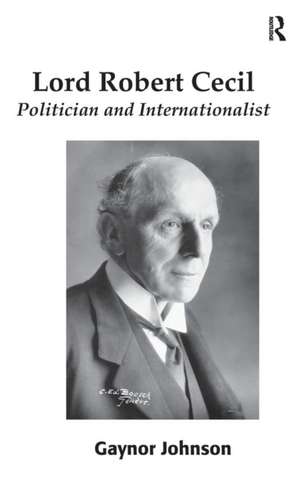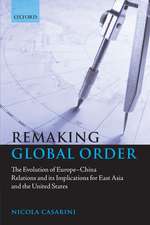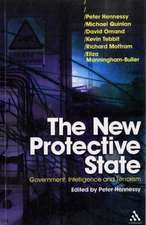Lord Robert Cecil: Politician and Internationalist
Autor Gaynor Johnsonen Limba Engleză Hardback – 23 oct 2013
Preț: 1041.54 lei
Preț vechi: 1144.54 lei
-9% Nou
Puncte Express: 1562
Preț estimativ în valută:
199.29€ • 208.83$ • 164.76£
199.29€ • 208.83$ • 164.76£
Carte disponibilă
Livrare economică 21 martie-04 aprilie
Livrare express 06-12 martie pentru 44.11 lei
Preluare comenzi: 021 569.72.76
Specificații
ISBN-13: 9780754669449
ISBN-10: 0754669440
Pagini: 376
Dimensiuni: 156 x 234 x 22 mm
Greutate: 0.84 kg
Ediția:New.
Editura: Taylor & Francis
Colecția Routledge
Locul publicării:Oxford, United Kingdom
ISBN-10: 0754669440
Pagini: 376
Dimensiuni: 156 x 234 x 22 mm
Greutate: 0.84 kg
Ediția:New.
Editura: Taylor & Francis
Colecția Routledge
Locul publicării:Oxford, United Kingdom
Notă biografică
Gaynor Johnson is Professor of History at the University of Kent, UK.
Cuprins
Introduction; Chapter 1 Inheritance; Chapter 2 Entering the Fray, 1903–14; Chapter 3 Changing Focus, 1914–19?; Chapter 4 The Origins of the League of Nations, 1916–18; Chapter 5 Paris Peace Conference, 1919; Chapter 6 Disarmament and First Challenges to League Authority, 1919–24; Chapter 7 The European Security Debate and the League Council Crisis, 1924–26; Chapter 8 Land and Air Disarmament Negotiations, 1925–27; Chapter 9 Naval Disarmament and the Geneva Naval Conference, 1925–27; Chapter 10 International Disarmament and Crisis in the Far East, 1928–34; Chapter 11 The Peace Ballot and the Rise of Fascism in Europe, 1934–39; Chapter 12 The Second World War, the United Nations and the Cold War, 1939–58; Chapter 101 Conclusion;
Descriere
Lawyer, politician, diplomat and leading architect of the League of Nations; Robert Cecil, 1st Viscount Cecil of Chelwood, was one of Britain's most significant statesmen of the twentieth century. Yet despite his prominence in the international peace movement, Cecil has, until now, never been the focus of an academic biography. Cecil has perhaps been judged unfairly due to his association with the League of Nations, which has since been generally regarded as a failure. However, recent academic research has highlighted the contribution of the League to the creation of many of the institutions and precepts that have, since the Second World War, become accepted parts of the international system, not least the United Nations.
















